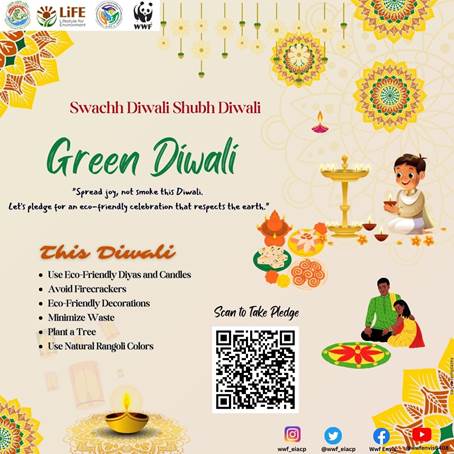MoEF&CC : WWF Programme Centre Promotes celebration of Swachh Diwali, Shubh Diwali: A Green, Plastic-Free Festival for a Sustainable Future”
The concept of Swachh Diwali Shubh Diwali emphasizes the importance of a clean and eco-friendly celebration that reiterates the core principles of Mission LiFE that aims to protect and preserve the environment, bringing about a pro-planet behavioural change in lifestyle. This initiative aims to instil a sense of responsibility towards the environment and communities by sensitizing and motivating individuals to opt for locally made products, embrace a Diwali free from single-use plastic and prioritize pre and post Diwali cleanliness. By doing so, it seeks to foster a sustainable and environmentally conscious approach to the festival.
In this context, WWF Programme Centre-Resource Partner, Ministry of Environment, Forest & Climate Change, GoI is disseminating awareness about Green Diwali celebration that would symbolize green, clean and plastic free Diwali through an infographic poster that contains a Green Diwali pledge. The mandate of Programme Centre at WWF-India, MoEF&CC is ‘Wildlife Conservation (including species and habitat) using geospatial techniques’. Programme Centre (PC) EIACP (Environmental Information, Awareness, Capacity Building and Livelihood Programme), Resource Partner (RP), Ministry of Environment, Forest and Climate Change, GoI at WWF-India was set up for collection, collation, storage, retrieval and dissemination of information in order to support and promote research, development and innovation among decision-makers, researchers, academicians, policy planners, research scientists & and other stakeholders.
This activity highlights a crucial step in integrating environmental consciousness into cultural practices, promoting sustainable festivities, and actively involving citizens in India’s climate agenda. Promoting a green, clean, cracker-free and plastic-free Diwali maintains the spirit of the festival while minimizing environmental impact. It aligns with traditional values of purity, light, and joy, showing that festivals can evolve to become more eco-conscious without compromising their cultural essence. The Green Diwali campaign resonates with India’s commitments under climate change agreements (like the Paris Accord) and sustainable development goals (SDGs), particularly SDG 13 (Climate Action) and SDG 12 (Responsible Consumption and Production).
Public participation through pledges encourages community-driven solutions. Individuals who engage with such campaigns may integrate green practices in their lifestyle, fostering long-term environmental stewardship.
Background
Mission LiFE (Lifestyle for Environment) was launched by the Prime Minister on 20th October, 2022 at Kevadia, Gujarat and focuses on bringing about behaviour changes individuals through simple easy to do actions. Ministry of Environment, Forest and Climate Change, GoI (MoEF&CC) is the nodal Ministry for national level coordination and implementation of Mission LiFE. As part of their implementation efforts, the ministry has mobilized their activities with LiFE and spread awareness about sustainable actions that individuals can undertake. Lifestyle for Environment (LiFE) was also among one of the four important focus sectors of the G-20 Summit.
As envisioned by Prime Minister at the World Leaders’ Summit in Glasgow at COP26 and launched on 20 October 2022, Mission LiFE aims to follow a three-pronged strategy for changing our collective approach towards sustainability. First is by nudging individuals to practise simple yet effective environment-friendly actions in their daily lives (demand); second is by enabling industries and markets to respond swiftly to the changing demand (supply) and; third is to influence government and industrial policy to support both sustainable consumption and production (policy).
